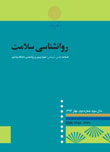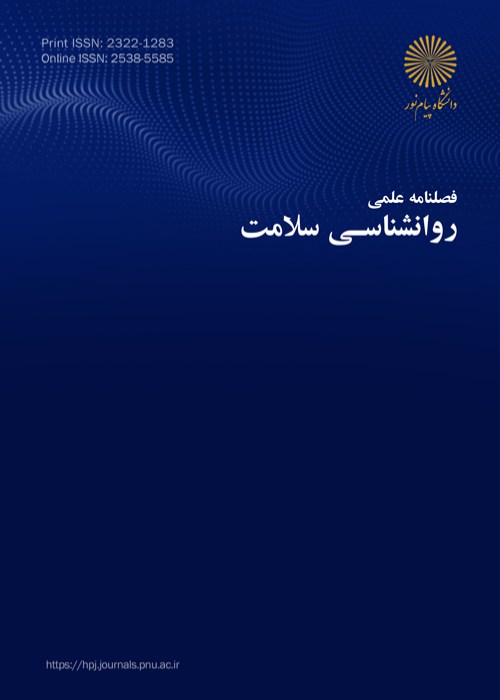فهرست مطالب

فصلنامه روانشناسی سلامت
پیاپی 17 (بهار 1395)
- تاریخ انتشار: 1395/03/26
- تعداد عناوین: 6
-
-
صفحات 20-35هدفاین پژوهش با هدف بررسی اثرترس القاشده برسطوح فشار خون سیستولیک و دیاستولیک ضمن حل مسایل طبقه بندی شده کشف مفهوم انجام شد.که تعداد 60 نفر از دانشجو یان که ازلحاظ هیجانی خنثی بودند دراین پژوهش مشارکت داده شدند.روشپژوهش حاضر ازنوع آزمایشی و از طرح پیش آزمون پس آزمون با گروه های کنترل استفاده شد. روش نمونه گیری تصادفی خوشه ایبود که از بین 8 دانشکده دانشگالزهرا(س) 200 دانشجو بطور تصادفی انتخاب شده و با پرسشنامه شخصیتی درون گرایی_ برون گرایی آیزنک مورد ارزیابی قرار گرفتند که از این تعداد 60 نفرآنها که از نظر درون گرایی_برون گرایی خنثی بودند انتخاب شده وبطور تصادفی به 6 گروه 10نفره(3 گروه آزمایشی و3 گروه کنترل) تقسیم شدند.سپس هرگروه تحت تاثیر یک سطح از مسایل طبقه بندی شده کشف مفهوم(ساده،نیمه پیچیده و پیچیده) طی دو مرحله قرار گرفتند و بین دو مرحله هیجان ترس به گروه های ازمایشی القا گردید. ابزارآزمایشی علاوه بر پرسشنامه شخصیتی آیزنک،کارتهای محقق ساخته جهت کشف مفهوم، برنامه القای ترس، دستگاه فشار سنج و کرونومتر بود. و داده ها با استفاده از آزمون تحلیل واریانس دو عاملی وبه وسیله نرم افزار آماری spss مورد تجزیه و تحلیل قرار گرفت.یافته هایافته ها نشان دادند که ترس بر فشارخون سیستولیک گروه ها در هر سه سطح تکلیف و بر فشارخون دیاستولیک گروه ها در دوسطح تکلیف ساده وپیچیده تاثیر معناداری داشته(pکلیدواژگان: ترس، فشارخون، سیستولیک، دیاستولیک، کشف مفهوم
-
Pages 4-15ObjectivePediatric cancer is a life threating and challenge for family and it may affect adjustment and mental health of the family members. Many factors such as harm avoidance and emotion regulation strategies may have a role in people's wellbeing when coping with stressful situations. The aim of the present study was to examine the mediating role of cognitive emotion regulation strategis on the relationship between harm avoidance and psychological well-being in parents of children with cancer.MethodMethod of the present exploratory study was correlational. A sample of 140 parents of children with cancer (70 men, 70 women) referred to one of the 3 assigned hospitals have been selected through convenience sampling method. All participants were asked to complete Cognitive Emotion Regulation Questionnaire (CERQ), harm avoidance subscale of Temperament and Character Inventory (TCI), and psychological well-being subscale of Mental Health Inventory (MHI).ResultsThe results showed that harm avoidance and psychological well-being are correlated with cognitive emotion regulation strategies. Regression analysis releaved that the relationship between harm avoidance and psychological wellbeing was mediated by cognitive emotion regulation strategis.ConclusionIt can be concluded that the relationship between harm avoidance and psychological well-being is not a simple linear one. This is partly mediated by cognitive emotion regulation strategis. Investigating the reciprocal effect of emotion regulation strategis and personality characteristics provides researcher with a more precise explanation of the role each of which may has on behavior and mental health.Keywords: cognitive emotion regulation, harm avoidance, psychological well, being, pediatric cancer
-
Pages 15-30ObjectiveAntisocial personality disorder (ASPD) is the most common comorbid disorder with substance dependency disorders, specially heroin among identified psychiatric disorders and ASPD predics weak outcomes in treatment of substance dependency disorders. Purpose of this study is was to examine the efficacy of dual focus schema therapy on reduction of severity of dependency in antisocial personality disorderded opioid dependent men.MethodThree antisocial personality disorderded opioid dependent men were selected using Millon Clinical Multiaxial Inventory (MCMI-III) and Structured Clinical Interview for DSM-IV (SCID) based on disorders axis II and purposeful sampling. Multiple baseline experimental single case study was used as the method of the present study. The treatment program was carried out for 24 week and 28 sessions, with a follow-up period of 3 months subsequent to treatment termination. Subjects completed Severity of Dependence Scale (SDS) and Young Schema Questionnaire (YSQ-SF).ResultsResults showed that dual focus schema therapy is significantly effective on reduction of severity of psychological dependency and primary maladaptive schemas.ConclusionDual focus schema therapy has appropriate efficacy on reduction of severity of dependency in antisocial personality disorderded opioid dependent men.Keywords: Substance dependency disorder, Antisocial personality disorder, Dual focus schema therapy
-
Pages 20-35The purpose of present study was to investigate the effect of inductive fear on the systolic and diastolic of blood pressure levels in solving classified problems of the identification concept (simple,semi complex,complex). The method of present study was experimental with pretest-posttest design having control groups. The population was undergraduate students from 8 faculties at Azahra University. A sample of 200 students selected randomly and they were assessed by Eysenek personality Inventory (Introversion extroversion).Then a sample of 60 students who scored moderate on this test drowned as statistical samples, randomly divided into 6 (3 experimental and 3 control) groups of ten people. Each group was under taken one of different levels of concept complexity tasks as well as blood pressures were measured. The experimental groups had inductive fear film between the two sessions. The instruments were 3 different levels of constructed concept cards and as well as personality test. Data were collected by pressure meter. Data were analyzed by two-way ANOVA test. The results showed that there were significant differences between groups to inereased systolic blood pressure in each 3 different of tasks.But there was no significant difference between groups to increased diastolic blood pressure in semi complex task.Keywords: Fear, Blood Pressur, systolic, diastolic, Concept Identifiction
-
Pages 30-45ObjectiveStress and other emotional distress are prevalent among cardiovascular patients. This study is performed to investigate the effect of medical counseling on stress and physiological factors of patients after coronary artery bypass graft surgery (CABG) and Percutaneous Transluminal Coronary Angioplasty (PTCA).MethodsThis study is of experimental type with pre-test, posttest and control group. Our sample consisted of 60 patients selected by a randomly accessible method and placed either into the experimental group or the control group. Stress was measured by Perceived Stress Scale (PSS) and physical factors data were obtained from patients files twice, before and after medical intervention.ResultsFindings showed that post-test stress in experimental group was less than that of PCI patients, though not significant. Data were analyzed using SPSS and MANCOVA.ConclusionMedical counseling lacked any significant effect on stress and physiological factors of these patients. The experience of stress in cardiac patients seems to be unique and different from other people, thus its measurement requires a scale specifically designed for these patients.Keywords: Stress, Cardiovascular disease, PCI, CABG, Medical counseling
-
Pages 45-60ObjectiveThis study aimed to investigate the model of self compassion as mediator between attachment dimensions with mental well-being in male and female personnel Sepidar prisoner city of Ahvaz was conducted .Method115 men and female from personnel Sepidar prison city of Ahvaz were selected by voluntary-available sampling method, and completed the Experience Close Relationship, Attachment Dimensions, Self-compassion, and Warwick-Edinburg Mental Well-being scales. The present study is descriptive-correlation and analysis of data was carried using simple correlation coefficient and h regression analysis by Baron and Kenny (1986), using SPSS-21 software .ResultsThe finding of self-compassion model was confirmed as mediating between anxiety and avoidant attachments and mental well-being both for direct paths and both for indirect paths .ConclusionIn result can suggest that safe attachments has role of important in health and well-being, but should not neglected of unique role of selfcompassion that mediating between attachment styles and mental well-being. good luckKeywords: Self, compassion, anxiety attachment, avoidance attachment, mental wellbeing
-
Pages 60-85ObjectiveBased on Youngs schema therapy model, three coping styles i.e. avoidance, surrender, and overcompensation is utilized against schema activation. Confronting with events, the type of dominant coping style affects general health. The aim of this study was to predict general health status (mental and physical) based on the type of dominant coping styles.MethodFor this purpose, Short-Form Health Survey questionnaire (SF-36), Young-Rygh Compensation Inventory (YCI), and Young-Rygh Avoidance Inventory (YAI) were filled by 120 students of University of Tehran sampled via convenience sampling. The results were analysis through correlation and multiple regression methods in SPSS software (version 18).ResultsThe results revealed that there is a significant relationship between two coping styles i.e. avoidance and overcompensation with general health status (p≤0/05).. In addition, regression analysis showed that overcompensation coping style has a major role in the prediction of general health status.ConclusionBased on the results, both coping styles i.e. avoidance and overcompensation have negative effect on general health, but facing with events through excessive overcompensation has more deteriorative effect on mental and physical health.Keywords: General health, Avoidance coping styles, Overcompensation coping styles


